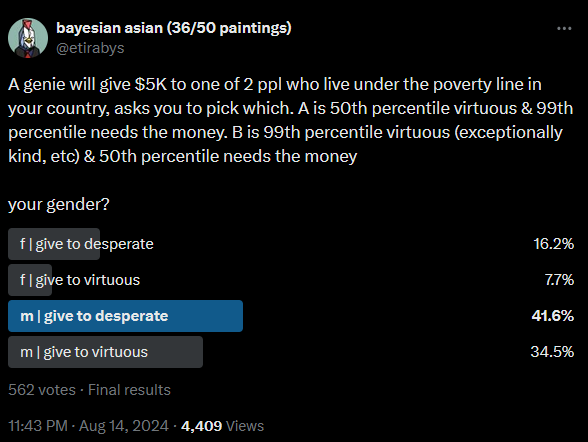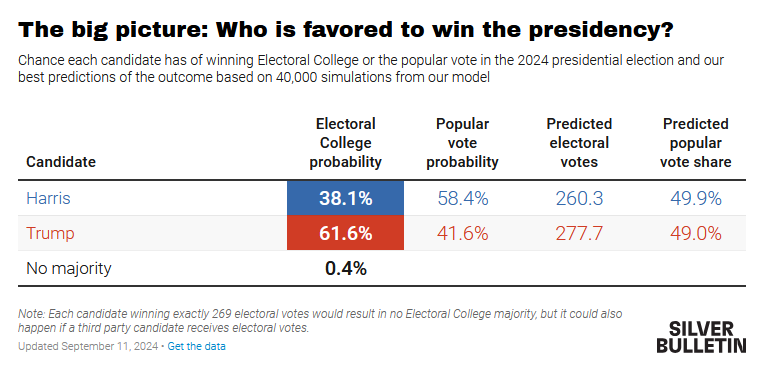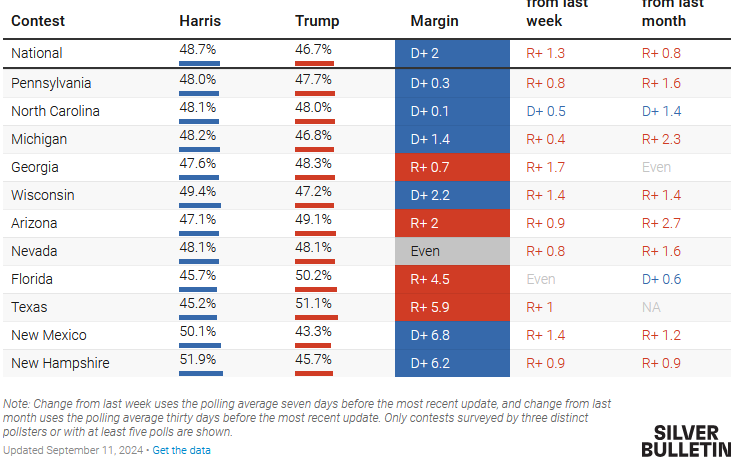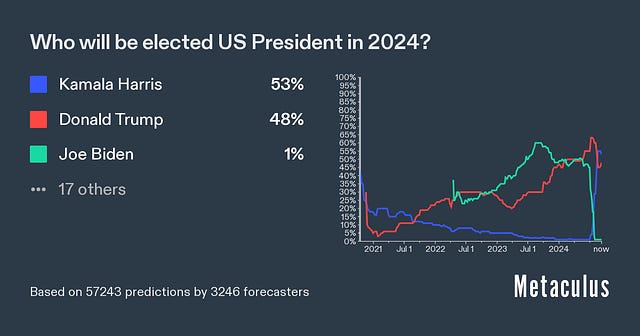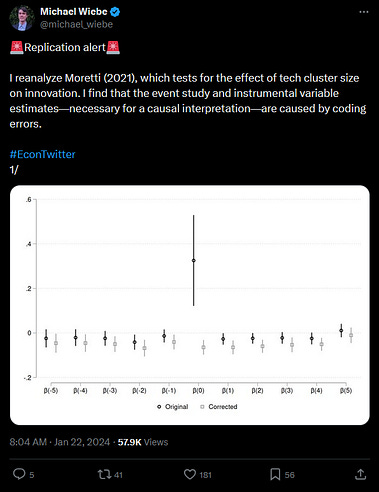Astral Codex Ten - Links For September 2024
[I haven’t independently verified each link. On average, commenters will end up spotting evidence that around two or three of the links in each links post are wrong or misleading. I correct these as I see them, and will highlight important corrections later, but I can’t guarantee I will have caught them all by the time you read this.] 1: NPR has an article on the movement to compensate kidney donors, including the role of ACX grantee Waitlist Zero. 2: Many personality differences are partly genetic. So why did evolution give different people genes for different personalities, instead of everyone converging onto one optimal personality? The debate has focused on two theories. First, maybe there is an optimal personality, but evolution doesn’t move fast enough to get us there (this would be like disease risk or IQ, where some people just luck into having better genes than others). Second, maybe there are rock-paper-scissors personality types such that convergence is itself a non-optimal strategy (this would be like gender, where if everyone else is a woman, then your best strategy for getting mates easily is to be a man, and vice versa, so we naturally end up 50-50). A new review analyzes the evidence, and finds pretty decisively that it’s the first one (there are optimal personalities but evolution is too slow to get there). Here’s the review paper, and here’s Ruben Arslan’s X discussion. 3: Ruxandra Teslo has a review of the theory that aristocratic women drove the early adoption of Christianity. I’m waiting to read Rodney Stark’s The Rise Of Christianity before having an opinion, but saving this to come back to later. 4: List Of Groups Who Protested The Democratic Convention (also continued on second tweet). This is real, but it reminds me of those multi-page shaggy-dog-joke lists of fictional bands or fictional conspiracies or something in Robert Anton Wilson books. 5: Why is Israel one of the only developed countries with above-replacement fertility rate? It’s natural to suspect some role for its ultra-Orthodox Jewish population, who live traditional lifestyles with large (5-10 children) families. But they’re not numerous enough to shift fertility all by themselves, and even secular Israelis have anomalously high fertility. Maybe the presence of the ultra-Orthodox shifts broader cultural norms? But then why don’t isolated high-fertility groups elsewhere (eg Amish and Mormons in the US) produce the same phenomenon? The “Nonzionism” blog gives the first really satisfying explanation I’ve seen: Israel has a uniquely continuous cultural gradient between their high-fertility subpopulation and everyone else (ie from ultra-Orthodox, to moderately-religious, to slightly-religious, to secular) with most stages having positive feelings about the stage above them (eg the moderately-religious respect the ultra-Orthodox for their piety). This lets ultra-Orthodox lifestyles percolate through and influence the general population in a way that eg Amish lifestyles don’t influence the average American. 6: …and I found the above a good appetizer before reading It’s Embarrassing To Be A Stay At Home Mom, which argues (I think correctly) that the root cause of declining fertility is what society finds honorable vs. low-status. Attempts to shore up fertility through economic means and free childcare have mostly failed. Attempts to shore it up with status (giving mothers of X children some kind of national award presented by a beloved figure) have . . . well, they’re at least correlated with success, although this post doesn’t prove causation as well as I’d like. In this model, Asians (Korea, Japan, etc) are having the most fertility issues because their societies are most collectivist, ie people more closely follow the gradient of what is vs. isn’t considered socially acceptable/high-status. I’m impressed by this post’s thoroughness, but also by arguments from the stay-at-home moms I know, who say people are constantly giving them grief about it, and who are often looking for some part-time make-work job they can take just so people will stop giving them grief about being a stay-at-home mother (a friend suggests this is responsible for most of the popularity of multi-level marketing - and this same friend argues that Korea could solve its fertility crisis by mandating that all K-pop idols have at least two children). 7: Related, from Regan Arntz-Gray: despite the discourse around “childless cat ladies”, only about 20% of fertility decline since 1976 comes from more women choosing not to have children. The other 80% of the decline comes from women who do have children having fewer of them - the average 1976 woman with children had 3.3! 8: Law students, like most academic elites, are mostly liberal. But part of US legal training is apprenticing with a judge. And the more prestigious the judge, the more prestigious the clerkship, and the more career capital it provides. Judges and Supreme Court Justices are appointed through partisan politics, so they're about 50-50 liberal/conservative. And conservative judges prefer clerks who share their values. So the few Republicans who go into law have an easier time getting good clerkships and ending up on a prestigious career path, leading to a sort of unintentional "affirmative action" for right-wingers. TracingWoodgrains on X gives the details and the stats. 9: The princess of Norway recently married an American “self-styled shaman” whose Wikipedia page makes him sound like a real catch:
10: After a four year experiment with Portugal-style decriminalization of hard drugs, Oregon has declared defeat and recriminalized them. Reasons cited include: they didn’t actually have enough substance abuse programs to send abusers to treatment instead of jail, the state mismanaged grants intended to create such programs, attempts to punish drugs with simple fines didn’t work because abusers didn’t pay them, and the fentanyl crisis is getting sufficiently bad that Oregonians felt less comfortable with experimental solutions. 11: Related: Steve Sailer on legalization vs. decriminalization of vice. My views evolved in something like the way Steve implicitly points at here: decriminalizing marijuana seemed to go okay, it seemed hypocritical and dumb for the law to be “marijuana is illegal but we won’t punish you for it in any way wink wink”, so (I thought) why not go all the way and legalize it? And the answer turns out to be: if it’s illegal but tolerated, then it’s supplied by random criminals; if it’s legal, it’s supplied by big corporations. And big corporations are good at advertising and tend to get what they want. 12: A while back I wrote a piece saying people needed to be clearer about what their “GET TOUGH” plans for dealing with mentally ill homeless people really meant. Later, Charles Lehman wrote a response describing his plan and arguing why it’s necessary. Most recently, Ozy has written a response to Charles, basically expressing fear that Charles’ plan will unnecessarily commit a bunch of harmless well-functioning people. I bet Charles’ response will be that no, this isn’t what he wants at all, to which my response will be that this is why you need to be clearer about what you mean. That is, I’m sure Charles wants to only commit people who need commitment, and not commit people who don’t, but he hasn’t explained the mechanism by which a fallible court system and medical system will ensure that this actually happens, and those are the kinds of details that I’m most interested in. 13: From here: 14: Why did the Ptolemaic Egyptian pharaohs marry their sisters? David Roman explains that it actually made sense by the logic of the time. Pharaohs didn’t necessarily consummate their marriages, and their heirs would usually be born from unrelated concubines, so the risk of inbreeding was low. What they really wanted was to avoid having to marry royal-line women off to anyone else - who could then create their own branches of the royal dynasty with competing claims to the throne. 15: The ominously named “cerebrolysin” has a positive reputation in the nootropics community, but Greg Fitzgerald and Dan Elton do a deep dive and find that its manufacturing process is so poor that it ends up being mostly random amino acids - ie it can’t possibly work the way its proponents suggest. Interestingly, cerebrolysin performed about the same as some definitely-real chemicals (eg melatonin, nicotine) on my old nootropics survey, re-emphasizing that most of what the survey measures is placebo effects. 16: Why is the Ukraine war a horrible grinding war of attrition like World War I, instead of resembling more dynamic modern conflicts? I asked this on an Open Thread and got some good answers:
17: Related: the ancient Greeks built a city called Chersonensus in Crimea. The Russian occupiers in Crimea are accused of “destroying” it in order to build some new structures there, alternately described as a museum, archaeological park, theater, or town (maybe there are all of these in different places)? Pro-Russian accounts do however point out that the museum/park/theater/town is really pretty: 18: Also related (source): 19: Ancient Chinese philosopher Wang Lin is known for, among other things, his arguments against the existence of ghosts. For example:
20: You’ve probably seen that whenever a new LLM comes out, it comes with a “model card” showing how it outperforms all other LLMs, performs at near-human or above-human level on benchmarks, and is definitely the most advanced technology ever invented. You’ve also probably assumed those are mostly garbage. Your assumption is correct, but if you want to know exactly what’s going on, and how to sift through it for the grains of truth, Lawrence Chen has an article on How To Read A Model Card. 21: PhilosophyBear reports the results of experiments by @halomancer1 and other X/Twitter users: the site appears to block users from posting slurs unless they have more than 30,000 followers, in which case it gives them a free pass. 22: Daniel Bottger (author of the recent Consciousness As Recursive Reflections guest post) reports that he has finished “his life’s work”, a set of seven secular sermons. The post says that he’s publishing now because he “might die in neurosurgery this Friday”, but he reports that he made it through and is currently recovering well. 23: Gender differences? (source) 24: Another day, another NYT doxxing scandal: an NYT reporter infiltrated a group chat of Jews talking about how they dealt with anti-Semitism. Then she shared the names of everyone in the group with someone who leaked it to anti-Israel activists. The activists proceeded to harass, stalk, threaten, and vandalize group members. NYT says that unspecified “disciplinary action” has been taken against the reporter, which apparently does not include firing her, demoting her, or any other effect observable in the physical world. 25: Sometimes business-minded presidential candidates say they will be “the CEO of America”. But did you know that America already has a CTO (Chief Technology Officer)? 26: I’ve lived in Oakland for five years now and never considered the possibility that it might be valorous, but apparently Kamala Harris is committing “stolen valor” by claiming she comes from Oakland (she actually comes from nearby Berkeley, which is apparently less cool). 27: Related: Trevor Klee’s impressions after visiting California. 28: Bryan Caplan asks readers what effect he has had on their lives. Many commenters say he convinced them to have children / more children than they otherwise would have, changed their education plans, or generally become kinder people. See also this Twitter poll, which if taken seriously suggests he’s at least partially responsible for ~100 extra people having children! 29: Related: Richard Hanania interviews Scott Greer about the Greerhead Pledge. Greer is a far-right influencer with many followers. He urges them to take “the Greerhead Pledge”, which he changes occasionally, but it’s always about avoiding various forms of vice and insufficiently-right-wing-compatible content (currently it’s at “no weed, no rap, no Marvel movies, no tattoos”). I find this an interesting transitional step between the usual influencer fan clubs and the kinds of real communities (or even religions) that can produce real change. I can’t find any publicly available community of Greerheads, so I don’t know how real it is, but the concept has potential. 30: CerebralLab argues for restraint around GLP-1 agonists - he is optimistic about them for people with serious disease, but reminds everyone that drugs have side effects and it might be worth pausing and thinking before basically healthy people take them to lose a few extra pounds. 31: Related: Nicholas Reville (of the Recursive Adaptation Substack) has finally gotten a coalition together to do formal clinical trials of GLP-1RAs for addiction:
32: Columbia’s anti-Semitism task force publishes their report. I guess I assumed that when people talked about anti-Semitism at college they meant pro-Palestine protests turning violent or something, but this suggests it’s much worse than that, eg people who wear Jewish head coverings getting spit on, Jewish students beings scared to walk alone on campus, etc. But props to them for publishing such a damning report and not trying to cover any of this up, I guess. 33: New paper suggests that aspects of Bayesian decision making are not disturbed during autism. I’m suspicious that we don’t really know which aspects to measure. But I would have linked this paper if it confirmed my beliefs, so I guess I have to link the real paper that came out negative. 34: Sasha Gusev has written an argument that twin studies are inaccurate and the heritability of IQ is much less than previously believed. It’s much better than the average obviously-dumb-and-motivated post trying to argue this, and contains lots of arguments I hadn’t seen before. See also subreddit comments on original, Gusev’s responses, comments on responses. My impression is that there’s enough circumstantial evidence (eg adoption studies) that this probably has to be wrong, but I don’t think any of the arguments against it land, and I don’t know enough statistical genetics to critique it myself. I’d be interested in seeing one of the more mathematically-inclined pro-heritability people (@gwern? Cremieux? steve hsu? Stuart Ritchie? @Gene Smith?) give their impression. 35: I’m not saying Satoshi Nakamoto was a CIA asset, but isn’t it weird that “Satoshi Nakamoto” is Japanese for “central intelligence”? 36: Amazon has added an incredibly annoying popup thing called “Rufus” that appears on every page now and can’t be turned off (Jeff Bezos would be turning in his grave). If you can’t figure out a good non-Amazon way to get the products you need, here’s a good description of how to banish it using uBlock. 37: Extelligence (aka “Some Guy”) is an excellent Substacker who often writes about his (unusual, colorful) life experiences. Here he has a very compelling account of the mystical experience that led him to religion. Highly recommended. And he asks that people who come to his blog for the colorful personal stories also read his proposal for solving the crisis of trust, based on something like a browser extension that adds something like Twitter’s Community Notes to every site. 38: Sequences Reading Group at Lighthaven. The Sequences are the founding text of the rationalist movement (readable here), and Lighthaven is the rationalist HQ in Berkeley. The first meeting has already happened, but you can RSVP to their mailing list for information on future (weekly?) meetups. 39: Sam Kriss on the online right, self-recommending: “Whether it calls itself the Right or the Left, the real content of all online politics is the internet itself, and the arc of online politics always bends towards a bunch of strangers who spend their entire lives on the computer demanding that you publicly denounce your friends.” 40: This month in prediction markets: a court reverses the CFTC’s ruling that Kalshi can’t have prediction markets on Congressional elections. I have to say - before I found a few subfields of politics where I was interested enough to follow the nuts and bolts, I never really understood how much of the law-making process was government agencies setting policies, the people who dislike those policies going to court, and the court cancelling the policies. Also, thanks to TracingWoodgrains and his lawyer friends for their related work trying to protect US prediction markets. 41: Nate Silver has a new book, On The Edge, about risky fields, the people who thrive in them, and the skills those people need. Here’s a mostly positive review, here’s another, and here’s a mostly negative one. Many of the negative reviews are dumb (“how dare he talk about gambling and capitalism without putting I HATE THEM in bold letters on every single page!”), but one of the better criticisms was that a lot of success in risky fields comes not from good risk intelligence, but from setting up heads-I-win-tails-you-lose style scams while pretending that your success comes from good risk intelligence. So one danger of knowing about the (very real!) importance of good risk intelligence is that it makes you more vulnerable to believing these people (although I understand that one part of Nate’s book describes how he was always suspicious of SBF, even before his misdeeds were public). 42: Related: Nate Silver’s model (subscriber only, sorry) currently (as of 9-11-24) gives Trump above 60-40 odds of winning: …even though Harris is ahead in most swing state polls: This is partly because his model is pricing in a “convention bounce” for the Democrats around now - it’s unclear whether it’s right to do so; without the bounce (also subscriber only) they’re at 50-50. Meanwhile, forecasters are a little more optimistic about Harris’ chances: 43: “[Why] I Left The Hegelian E-Girl Council”. Indeed do many things come to pass. 44: New voices in favor of SB 1047 California bill on regulating AI - Elon Musk, net neutrality + open software hero Lawrence Lessig, and formerly-skeptical AI company Anthropic. Meanwhile, opponents are sticking to their talking point that it’s an attempt by incumbents to shut down upstart competitors (funny; the biggest incumbent, OpenAI, is against it), and trying to muddy the waters with really dumb polls. Come on Marc, you can do better than this! 45: Debating which candidate has better policies seems so almost comical these days - isn’t everyone already sure which candidate is an ontologically-evil commie Nazi, and which is a bold hero riding in to save the Union? Still, a few people have taken on this thankless task, most notably Richard Hanania for Trump and Jeff Maurer for Harris. The most compelling pro-Trump argument is that Harris endorses some utterly idiotic economic policies (eg price controls) that could make everyone poorer and (if doubled down upon) knock the US into corrupt perma-stagnation like the worse parts of Europe, and these are so comically bad that they should override Harris’ advantages in other areas. But Maurer argues that even sticking to economics (Trump’s relatively non-crazy area), once you add up Trump’s proposed tariffs, threats to Fed independence, and NIMBYism he doesn’t look any better than Harris here - and then he loses on the non-economic and character issues. And Bentham’s Bulldog (pro-Harris) and Samuel Hammond (pro-Trump) make cases of their own within a more specifically EA framework around existential risks, etc. 46: An unsympathetic portrayal of what went wrong with Lambda School (now BloomTech), a programming boot camp which deferred tuition until after you got a programming job and could easily pay them back. It got started right when a bumper crop of programming bootcamps created a glut of entry-level programmers - but more than that, the school leadership responded poorly, inflating their placement statistics and going after former students in borderline predatory ways. 47: Did you know: Malaysia not only has a king, but also a Deputy King. 48: Despite what you hear, Republicans support Ukraine over Russia by 58% to 4% (and in accordance with what you hear, Democrats support them by 76% to 1%). 49: Michael Wiebe continues to do great work replicating (and failing to replicate) econ papers. Most recently (source): It really does seem like a lot of big economics results that get brought out in policy debates aren’t just wrong, but simple-coding error wrong, and that one person has discovered a bunch of these. The hero we’ve all been waiting for! 50: Did you know: one of the landmark cases on gender transition in Australia is called Tickle vs. Giggle, and Australian gender warriors have to have strong opinions on Tickle vs. Giggle and its ramifications. This seems like a good (albeit unintentional) way to make people feel embarrassed to center their entire political identity around this topic. You're currently a free subscriber to Astral Codex Ten. For the full experience, upgrade your subscription. |
Older messages
Contra DeBoer On Temporal Copernicanism
Tuesday, September 10, 2024
... ͏ ͏ ͏ ͏ ͏ ͏ ͏ ͏ ͏ ͏ ͏ ͏ ͏ ͏ ͏ ͏ ͏ ͏ ͏ ͏ ͏ ͏ ͏ ͏ ͏ ͏ ͏ ͏ ͏ ͏ ͏ ͏ ͏ ͏ ͏ ͏ ͏ ͏ ͏ ͏ ͏ ͏ ͏ ͏ ͏ ͏ ͏ ͏ ͏ ͏ ͏ ͏ ͏ ͏ ͏ ͏ ͏ ͏ ͏ ͏ ͏ ͏ ͏ ͏ ͏ ͏ ͏ ͏ ͏ ͏ ͏ ͏ ͏ ͏ ͏ ͏ ͏ ͏ ͏ ͏ ͏ ͏ ͏ ͏ ͏ ͏ ͏ ͏ ͏ ͏ ͏ ͏ ͏ ͏ ͏ ͏ ͏ ͏ ͏
Open Thread 346
Monday, September 9, 2024
... ͏ ͏ ͏ ͏ ͏ ͏ ͏ ͏ ͏ ͏ ͏ ͏ ͏ ͏ ͏ ͏ ͏ ͏ ͏ ͏ ͏ ͏ ͏ ͏ ͏ ͏ ͏ ͏ ͏ ͏ ͏ ͏ ͏ ͏ ͏ ͏ ͏ ͏ ͏ ͏ ͏ ͏ ͏ ͏ ͏ ͏ ͏ ͏ ͏ ͏ ͏ ͏ ͏ ͏ ͏ ͏ ͏ ͏ ͏ ͏ ͏ ͏ ͏ ͏ ͏ ͏ ͏ ͏ ͏ ͏ ͏ ͏ ͏ ͏ ͏ ͏ ͏ ͏ ͏ ͏ ͏ ͏ ͏ ͏ ͏ ͏ ͏ ͏ ͏ ͏ ͏ ͏ ͏ ͏ ͏ ͏ ͏ ͏ ͏
Your Book Review: The Pale King
Friday, September 6, 2024
Finalist #12 in the Book Review Contest ͏ ͏ ͏ ͏ ͏ ͏ ͏ ͏ ͏ ͏ ͏ ͏ ͏ ͏ ͏ ͏ ͏ ͏ ͏ ͏ ͏ ͏ ͏ ͏ ͏ ͏ ͏ ͏ ͏ ͏ ͏ ͏ ͏ ͏ ͏ ͏ ͏ ͏ ͏ ͏ ͏ ͏ ͏ ͏ ͏ ͏ ͏ ͏ ͏ ͏ ͏ ͏ ͏ ͏ ͏ ͏ ͏ ͏ ͏ ͏ ͏ ͏ ͏ ͏ ͏ ͏ ͏ ͏ ͏ ͏ ͏ ͏ ͏ ͏ ͏ ͏ ͏ ͏ ͏ ͏ ͏
Highlights From The Comments On "Sorry You Feel That Way"
Thursday, September 5, 2024
... ͏ ͏ ͏ ͏ ͏ ͏ ͏ ͏ ͏ ͏ ͏ ͏ ͏ ͏ ͏ ͏ ͏ ͏ ͏ ͏ ͏ ͏ ͏ ͏ ͏ ͏ ͏ ͏ ͏ ͏ ͏ ͏ ͏ ͏ ͏ ͏ ͏ ͏ ͏ ͏ ͏ ͏ ͏ ͏ ͏ ͏ ͏ ͏ ͏ ͏ ͏ ͏ ͏ ͏ ͏ ͏ ͏ ͏ ͏ ͏ ͏ ͏ ͏ ͏ ͏ ͏ ͏ ͏ ͏ ͏ ͏ ͏ ͏ ͏ ͏ ͏ ͏ ͏ ͏ ͏ ͏ ͏ ͏ ͏ ͏ ͏ ͏ ͏ ͏ ͏ ͏ ͏ ͏ ͏ ͏ ͏ ͏ ͏ ͏
Interview Day At Thiel Capital
Tuesday, September 3, 2024
... ͏ ͏ ͏ ͏ ͏ ͏ ͏ ͏ ͏ ͏ ͏ ͏ ͏ ͏ ͏ ͏ ͏ ͏ ͏ ͏ ͏ ͏ ͏ ͏ ͏ ͏ ͏ ͏ ͏ ͏ ͏ ͏ ͏ ͏ ͏ ͏ ͏ ͏ ͏ ͏ ͏ ͏ ͏ ͏ ͏ ͏ ͏ ͏ ͏ ͏ ͏ ͏ ͏ ͏ ͏ ͏ ͏ ͏ ͏ ͏ ͏ ͏ ͏ ͏ ͏ ͏ ͏ ͏ ͏ ͏ ͏ ͏ ͏ ͏ ͏ ͏ ͏ ͏ ͏ ͏ ͏ ͏ ͏ ͏ ͏ ͏ ͏ ͏ ͏ ͏ ͏ ͏ ͏ ͏ ͏ ͏ ͏ ͏ ͏
You Might Also Like
Trump Boots Zelensky, English Official U.S. Language, and a Daring Rescue
Saturday, March 1, 2025
A highly anticipated White House meeting on a Ukraine rare earth minerals deal turned confrontational Friday, with President Trump and Vice President Vance clashing with President Zelensky, leaving the
☕ Hanging up on Skype
Saturday, March 1, 2025
Microsoft pulls the plug on the OG video chat... March 01, 2025 View Online | Sign Up | Shop Morning Brew Presented By Boka Good morning. Have you ever watched videos featuring our insanely funny
106718 is your Substack verification code
Saturday, March 1, 2025
Here's your verification code to sign in to Substack: 106718 This code will only be valid for the next 10 minutes. If the code does not work, you can use this login verification link: Verify email
234474 is your Substack verification code
Saturday, March 1, 2025
Here's your verification code to sign in to Substack: 234474 This code will only be valid for the next 10 minutes. If the code does not work, you can use this login verification link: Verify email
790484 is your Substack verification code
Saturday, March 1, 2025
Here's your verification code to sign in to Substack: 790484 This code will only be valid for the next 10 minutes. If the code does not work, you can use this login verification link: Verify email
Have We All Just Agreed to Live With Soul-Crushing Racism?
Saturday, March 1, 2025
February 28, 2025 THE SYSTEM Have We All Just Agreed to Live With Soul-Crushing Racism? By Zak Cheney-Rice Elon Musk throwing up a Nazi-style salute on Trump's Inauguration Day. Photo: Mark
342612 is your Substack verification code
Friday, February 28, 2025
Here's your verification code to sign in to Substack: 342612 This code will only be valid for the next 10 minutes. If the code does not work, you can use this login verification link: Verify email
What A Day: Vodka shots fired
Friday, February 28, 2025
Did American support for Ukraine's war with Russia just melt down on live TV? It sure looks that way… and Putin's pals are “already on their seventh vodka toast.” ͏ ͏ ͏ ͏ ͏ ͏ ͏ ͏ ͏ ͏ ͏ ͏ ͏ ͏ ͏
Friday Sales: Half-Off Eberjey and $99 Salomons
Friday, February 28, 2025
Including woven Merrells and a colorful Hydro Flask. The Strategist Every product is independently selected by editors. If you buy something through our links, New York may earn an affiliate commission
Google sets long-term plan to exit Seattle’s Fremont neighborhood, consolidate in South Lake Union
Friday, February 28, 2025
Breaking News from GeekWire GeekWire.com | View in browser Google confirmed Friday that the company plans to bring all its employees in Seattle together at its South Lake Union campus, citing a desire



